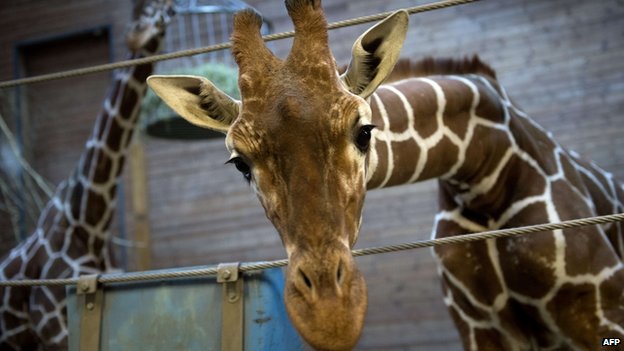February 10, 2014Comments are closed.attitude

Overnight, despite enormous community backlash, a young giraffe deemed ‘surplus’ by a Copenhagen Zoo was killed and fed to the zoo’s tigers and other carnivores.
Thousands had appealed for a change of heart over the two-year-old, called Marius, who had been born at the zoo.
The zoo called the killing of this young, healthy animal for the the organisation’s own convenience ‘euthanasia’ (dubbed ‘zoothanasia’), and according to the zoo’s spokespeople these euthanasias occur some 20-30 times in a typical year.
Sickeningly and absurdly, the zoo’s reaction to its community’s offence, mirrors almost exactly the communications strategy of a high-kill shelter under pressure.
A desperate community trying to save an individual life…
“Thousands of people had signed an online petition appealing for a change of heart…”
Rescue groups being rejected at the door…
“The UK’s Yorkshire Wildlife Park – which has a state-of-the-art giraffe house and the capacity for an extra male – was among several zoos which put in last-ditch offers to take Marius.”
The director of a wildlife park in the Netherlands, Robert Krijuff, whose last-minute offer of a place was also rejected, said: “I can’t believe it. We offered to save his life. Zoos need to change the way they do business.”
A high-kill organisation who claims there is no other way – in fact, it should be respected for making the tough decisions…
“The zoo said it had no choice because of its duty to avoid in-breeding.
He told the BBC it was a responsible practice for zoos to manage their animal populations to ensure they remained healthy…
That killing is a benefit to the community…
A crowd of visitors, including children, watched as the carcass was skinned, cut up and fed to the lions.
“I’m actually proud because I think we have given children a huge understanding of the anatomy of a giraffe that they wouldn’t have had from watching a giraffe in a photo,” (a spokesman for the zoo) Stenbaek Bro told AP.
We can’t save them all – other animals are more saveable…
(The zoo’s scientific director, Bengt Holst) said all zoos had been considered and there was no place for Marius – including at Yorkshire where, he said, any space should be reserved for a genetically more important giraffe.”
Because ‘too many animals, not enough homes’…
“Giraffes today breed very well, and when they do you have to choose and make sure the ones you keep are the ones with the best genes,” Holst told the BBC.
An eye-roll at those wanting to save the creature…
The campaign to save him, he said, had gone “much too far”.
He could not understand the fuss Marius’s impending destruction had generated, pointing out that, for instance, 700-800 deer are killed every year at a deer park north of Copenhagen to control their numbers.
An effort to discredit critics as unreasonable, and a reaffirmation that nothing should change…
The zoo’s scientific director, Bengt Holst, told the BBC he had received death threats but would not alter his style of animal management.
And finally, rescuers pulling their hair out at the apathy and lack of proactiveness…
Stine Jensen, from Denmark’s Organisation Against the Suffering of Animals, said “Here we have a zoo which thinks that putting this giraffe down instead of thinking of alternatives is the best option,” she said.
Marius was a healthy sentient being, however, the zoo responsible for protecting his life, saw him as nothing more than a disposable object for their use:
“It would be absolutely foolish to throw away a few hundred kilos of meat,” Mr Holst said according to the Swedish newspaper Svenska Dagbladet. “Some is used for research and the rest for food.”
When killing is an acceptable part of processes, animals lose their individual value. Whether it be a shelter caring for our dogs and cats, or a zoo caring for the world’s most iconic beasts.
Referenced articles: http://www.bbc.co.uk/news/world-europe-26098935
http://www.policemc.gov.bh/en/news_details.aspx?type=2&articleId=21688
Denmark is stupid, they also have problems with domestic dogs and breed discrimination. Animals need some kind of rights to protect them from people. There should be laws that COMPLETELY PROHIBIT putting down a healthy animal which is being held in captivity. If someone wants to help or rehome an animal then why shouldn,t they?